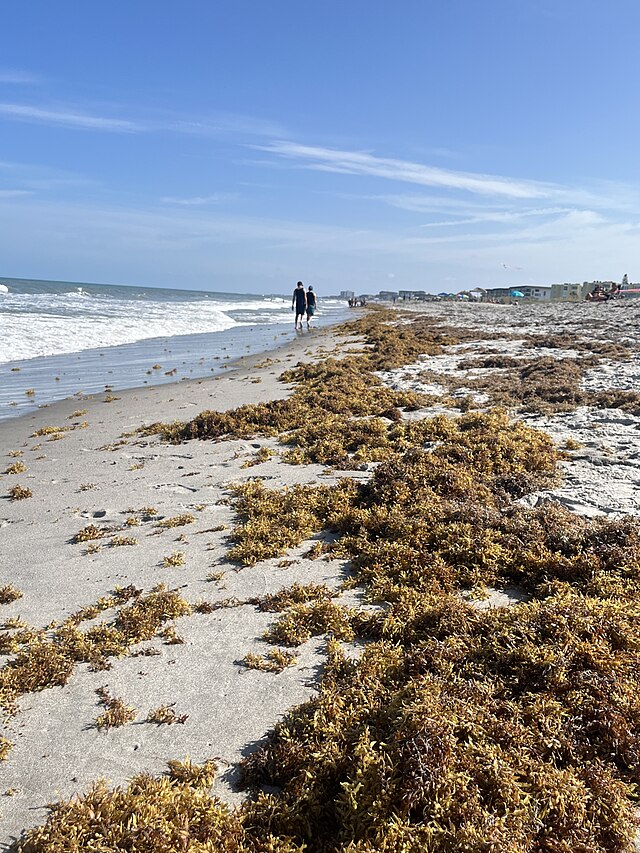Mexicans may think it’s unlucky to have seaweed wash up on their beautiful beaches, but, looked at from the natural resource perspective, the country is truly fortunate to have a surplus of Sargassum seaweed! They just need to harvest it before it would ever reach the beach….
Recent Climate and Population Changes Have Resulted in the Expansion of Sargassum
Until not too long ago, Sargassum, an algae famous from the Sargasso Sea of marine legends, has been largely confined in an ocean gyre between the Caribbean Sea and offshore of the southern U.S. The gyre’s circular current has roughly contained the floating mass of algae, which has historically had little distribution outside its central mass.
What’s causing the problems with Sargassum today? Several ecological changes have resulted in a rapid expansion of Sargassum, spreading more and more each year. The warming climate has caused the gyre current to lose its focus and become less defined, so that it no longer effectively contains the algae.
Perhaps more importantly, increased nutrients have multiplied the size of the Sargasso gyre, due to the increasing amount of chemical fertilizers used in agriculture and the increasing amount of sewage from expanding populations in coastal areas.
Added to these intractable conditions, supertankers now plow straight through the Sargasso Sea, breaking up formerly stable mats of the algae and setting them adrift on currents out of the gyre.
Sargassum Can Become a Valuable Renewable Resource
The ocean’s Sargassum surplus constitutes a landless biofiltration and solar-energy-collection system offering valuable, ecologically sound co-products, specifically fertilizer, alginates, and alcohol (ethanol).
Alginates are a high-value substance used in thickening and gelling foods and cosmetics, and in the research biology industries. Alginates can also serve as a medium to suspend valuable fertilizers in the soil instead of having them wash out during rainfall or irrigation.
Alcohol (ethanol) is produced from plants by fermenting their carbohydrates. Carbohydrates are composed of carbon dioxide (carbo) and water (hydrates) bound together by sunlight.
Marine algae can be a very efficient biofilter. Some marine algae can absorb fertilizer nutrients such as nitrogen, phosphorus, and potassium (NPK) and concentrate them 58,000 times over their dilution in sea water.
People Need to Eat, But Fertilizer Costs Are Out of Control
The war in the Ukraine has forced the closure of its phosphorus and potassium mines, pointing out an uncomfortable truth: A worldwide shortage of vital non-renewable fertilizer now threatens the global food supply.
We humans are addicted to food and cannot do without our daily fix. No world leader wants to face food riots.
Due to worldwide continued population growth, plus the rising standard of living in China and India, demand for food and therefore fertilizer is predicted to never reduce. Even when (or if) the Ukrainian fertilizer mines come back online, ever-increasing millions of people will be dying of starvation annually around the globe as mineral mines become depleted.
Renewable fertilizer made from Sargassum solves that problem. It also helps alleviate problems caused by non-renewable fertilizers — which become crops that are eaten and then become sewage in waterways, flowing down the rivers into the sea. These nutrients are generally considered lost but can be reclaimed via marine algae fertilizer.
Prior to the war in Ukraine, farmers worldwide generally attributed 7% of their operating expenses to fertilizer. Now this essential expense is between 38-40% of OPEX.
Abundant Carbohydrates Create Abundant Alcohol (Ethanol)
Sargassum produces abundant carbohydrates that can readily be converted to alcohol (ethanol), a valuable industrial chemical.
Ethanol is also an inexpensive, renewable, virtually pollution-free substitute for gasoline and diesel. In fact, oceangoing freighters are now being sold that run on a choice of alcohol or bunker diesel, at comparable economics — and the alcohol fuel runs the ship without polluting the air and ocean.
Marine algae can yield as much as 100 times the amount of alcohol fuel per hectare as sugar cane or corn, the current major crops for producing ethanol.
Mexico’s Sargassum Surplus Is an Immense Renewable Resource
In short, the surplus of Sargassum in coastal Mexico is an immense renewable resource vital to its economy, and a valuable export opportunity. The combination of co-products derived from marine algae creates a highly profitable, very green, carbon-negative business.
Harvesting the Sargassum from the coastal waters rather than after it reaches land is a lucrative business that also protects public health and tourism. Contact us.

